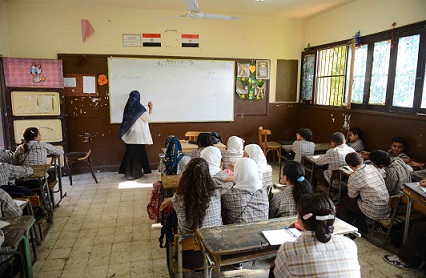Egypt’s education system has been plagued with problems in recent years. The most recent indicator for that would be the continuous and ongoing exam leaks taking place on social media during the thanaweyya amma exam season. Parents, students, and the parliament have blamed the minister of education for his inability to stop the leaks.
However, the problems are not only confined to the administrative process of the education system—the quality of education itself is one of the main issues in the field. According to the Global Competitiveness Report 2015-2016, Egypt ranked 139 out of 140 countries worldwide in terms of education quality. This ranking has not changed positively—if at all—in recent years, signifying another problem in the system: the difficulty of reform.
In an attempt to show a willingness to reform and ameliorate the situation, the government has called for the private sector to participate in building schools. The private sector’s hesitance in that regard is not only based on the challenges they are facing, but primarily to their willingness to invest in the education sector. Daily News Egypt sat down with Hassan Al Kalla, chairperson of Cairo for Development and Investment Company (CDIC), discussing the balance and discrepancy between quality and cost within the education sector.
Did the government hold talks with the company about its initiative to partner with the private sector?
Yes, the company participated in two meetings held by the Ministry of Education a couple of months ago; however, we have not been in touch since. The meetings revolved around how the government could implement its initiative, and how to face the challenges that may come in the initiative’s way.
What do you think of the initiative?
It is an excellent idea, especially during the current economic conditions, but there are obstacles that could affect the initiative’s efficiency.
What obstacles are you referring to?
The government wants to reform the sector into a totalitarian system. It wants the private sector to invest, but at the same time, wants to limit the admission fees to an amount it specifies. Fees of EGP 2,000 do not represent the actual cost of providing good education, so the government should study the actual operating cost and set an attractive profit margin for the investors.
What would be ‘attractive’ fees for private sector schools?
A lot of private sector studies show that appropriate fees should amount to approximately EGP 8,000 – EGP 10,000 annually. The education process mainly relies on human resources, so the staff’s salaries must be fair to guarantee the quality of education.
How much should a teacher get paid to provide ‘good’ education?
A fair salary for a teacher ranges from EGP 3,000 – EGP 4,000 in private schools, but it cannot be more than EGP 1,500 in governmental schools.
The low salary affects the quality of education, which results in poorly educated students.
How much are a school’s building costs?
Building a school costs EGP 30m – 40m. This excludes the price of the needed land. According to cost-benefit analyses, a student should pay EGP 3,600 annually, just to cover the construction costs.
What other obstacles are facing the initiative?
One of them is that the ministry set a maximum percentage at 3% for the annual tuition fee increase, which does not make any sense because salaries alone should enjoy a 10% annual raise.
The annual tuition fee increase must also be equivalent to the increase of inflation rates, in order not to negatively affect the investor’s profit margin.
Prime Minister Sherif Ismail said the government will allocate EGP 51bn to reform education. Do you believe in the government’s ability to afford this amount? And do you think it is a sufficient amount for education reform?
First of all, I do not think the government will be able to provide this number because of its limited financial resources, especially given the current bad economic conditions. The state’s resources are wasted, so we need to properly manage financial allocations for education in order to ensure efficiency.
Secondly, developing and reforming education does not solely depend on money. It is a matter of finding ways to fix problems and think outside of the box. Education Minister El-Helaly El-Sherbiny deals with the private sector with the mentality of a police officer—he has no idea on how to reform education.
To reform education, we need to develop a proper examination system. The recent exam leaks show us that our corrupt old system can no longer be applied.
We also need to apply modern school self-management techniques, such as self-study in combination with face-to-face seminars. More than 15 million students use self-study techniques in the US. Our old way of doing things has proven its failure.
The minister should not have the authority to interfere with every little detail in every school in Egypt. Education development cannot be merely achieved through administrative decisions, which is the only method the current minister is applying.
What about higher education?
Higher education in Egypt is facing a lot of challenges. There is a gap of about 200,000 between high school graduates and the available slots for students in universities.
How many universities does Egypt need in order to eliminate this gap?
Egypt needs to build 30 public and/or private universities immediately to eliminate this gap.




